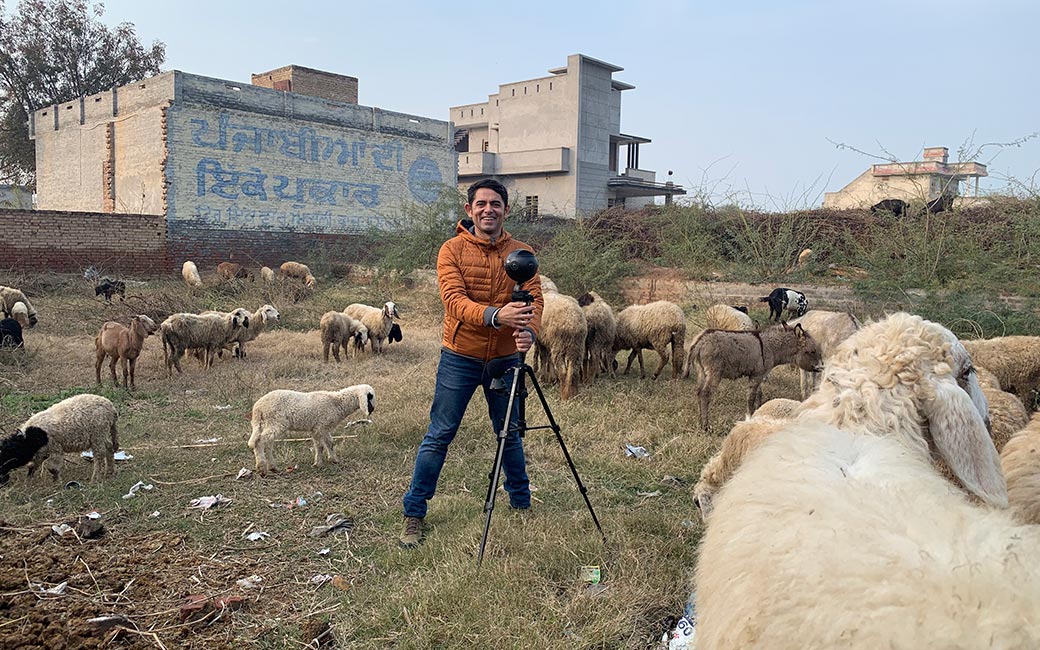Whiting Foundation awards $50,000 to Harjant Gill for research exploring masculinity in Indian society
Associate professor one of seven national 2021 Public Engagement Fellows
By Rebecca Kirkman on May 31, 2021

As a visual anthropologist, Towson University associate professor Harjant Gill approaches his scholarship with the goal of sharing it with the masses. Often, his research culminates in films and other visual media.
That’s why his current project, “Tales from Macholand”—which aims to explore masculinity in Indian society through a series of virtual reality (VR) films—earned Gill one of seven $50,000 Public Engagement Fellowships from the Whiting Foundation.
The Whiting Public Engagement Program champions the public humanities and highlights the role scholars play in deploying the humanities for the public good.
The foundation also awarded five $2,000 seed grants.
“The humanities make a crucial difference for all of us,” says Daniel Reid, executive director of the Whiting Foundation. “These 12 projects will build bridges within and across communities, enrich our understanding and help us interpret the world around us and make our lives more meaningful through deep context, rich exchange and careful inquiry.”
Gill’s nine-part, immersive VR series will chronicle the experiences of nine Indian men, women and third-gender individuals of different castes and ethnic backgrounds who do not adhere to conventional gender roles and societal expectations.
The immersive format will give audiences an opportunity to connect deeply with these stories on an interpersonal level. Gill will use the series to engage Indian youth in conversations about how their lives are affected by gender, power, caste and sexuality in Indian culture.
“I describe myself as a public anthropologist or public scholar, and I was trained in a department that's very applied and public focused,” Gill says. “So it's very important when my work is recognized by organizations and programs like the Whiting Foundation that are there for that specific purpose of connecting academic scholarship and public application.”
The project, which he began as Fulbright Scholar, was interrupted by the novel coronavirus pandemic. Just before he was about to start filming in April 2020, the Fulbright fellowship was canceled, and all scholars were asked to return to the U.S.
The Whiting Foundation fellowship will enable Gill to return to India later this year to reconnect with the documentary’s subjects and begin filming.
“Dr. Gill’s work represents the college’s support of expansive research in the humanities, the use of the latest technologies and public engagement to explore difficult topics with a goal of enlightenment and change,” says College of Liberal Arts Dean Chris Chulos. “One of the most exciting parts of this project is the expected distribution and access of the series through low-cost VR headsets and availability in more traditional platforms. As virtual reality becomes the modality of today’s younger generation, Dr. Gill uses it as a way to bring together ancient story-telling, anthropological “thick-description” and personal engagement.”
He instills his approach to public-facing scholarship in his visual anthropology students, some of whom have made VR projects of their own.
“I tell them, ‘Don't make it for me. Make it for the rest of the world to see. Yes, I’m going to grade it, but I want you to think of your audience to be someone outside of academia,’” Gill says. “I try to engrain that idea of public or engaged scholarship, to take what you know right now and apply it to how you see the world, how you engage with the world and the work that you do.”
Gill credits Dean Chulos and his colleagues in the Department of Sociology, Anthropology & Criminal Justice for creating an environment that supports and encourages faculty in their research and in applying for funding opportunities.
And he feels it’s never been more important to make scholarship approachable to the masses.
“Especially now, because we’re in these uncertain times, it’s a responsibility of academics and scholars to share their knowledge and what they’ve learned in a way that is accessible to the world,” he says. “We need to bring knowledge out of the ivory towers; there’s such a need for it.”